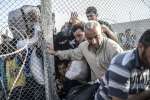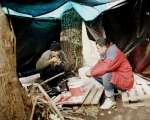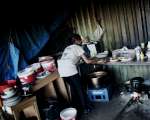Some 23,000 refugees flee latest Syria fighting into southern Turkey
News Stories, 16 June 2015
GENEVA, June 16 (UNHCR) – The UN refugee agency says new fighting in northern Syria has sent a further 23,135 refugees fleeing across the border into Turkey's Sanliurfa province.
UNHCR said that according to information received on Tuesday from the Turkish authorities, some 70 per cent of these were women and children.
"Since June 3, when the latest fighting erupted, people have been allowed across the border between the two countries at the Akcakale crossing and at several points between Sanliurfa and Syria's Raqqa province," UNHCR spokesperson William Spindler told a press briefing in Geneva.
Most of the new arrivals are Syrians escaping fighting between rival military forces in and around the key border town of Tel Abyad, which was controlled by militants, and faces Akcakale across the border. However, they also include so far 2,183 Iraqis from the cities of Mosul, Ramadi and Falujjah.
According to UNHCR staff in the field most of the refugees are exhausted and arrive carrying just a few belongings. Some have walked for days.
Since the arrivals began, UNHCR staff members have visited several areas where people were crossing or waiting to cross. In recent days, people have fled directly to Akcakale to escape fighting in Tel Abyad.
International media have carried claims by the attacking forces to have captured the town.
"UNHCR has not been able to confirm this. However, the border was reported calm at Akcakale on Tuesday morning," Spindler noted.
At Akcakale, which lies some 80 km north of the Syrian city of Raqqa, the Turkish authorities have set up facilities for initial registration of the new arrivals and to provide them with food and water. Children are being vaccinated.
Most of the refugees are staying with friends or relatives in and around Akcakale, but some with special needs or no alternative have moved to the refugee camps of Derik and Suruc.
Following a request from Turkey's emergency relief agency, AFAD, UNHCR said it has provided 27,000 items of children's clothing, 33,000 blankets and 8,000 mattresses. These will be distributed by the Turkish authorities.
UN High Commissioner for Refugees António Guterres has chosen to spend World Refugee Day (June 20) meeting refugees in Turkey in recognition of that country's vital role as a host nation.
Latest available data showed Turkey is hosting 1,772,535 registered Syrian refugees, more than any other in the world. About 259,000 of these refugees live in 23 camps set up and managed by the government.
"UNHCR urges the international community to continue to help shoulder the burden with Turkey and other neighbouring countries," Spindler added.














































